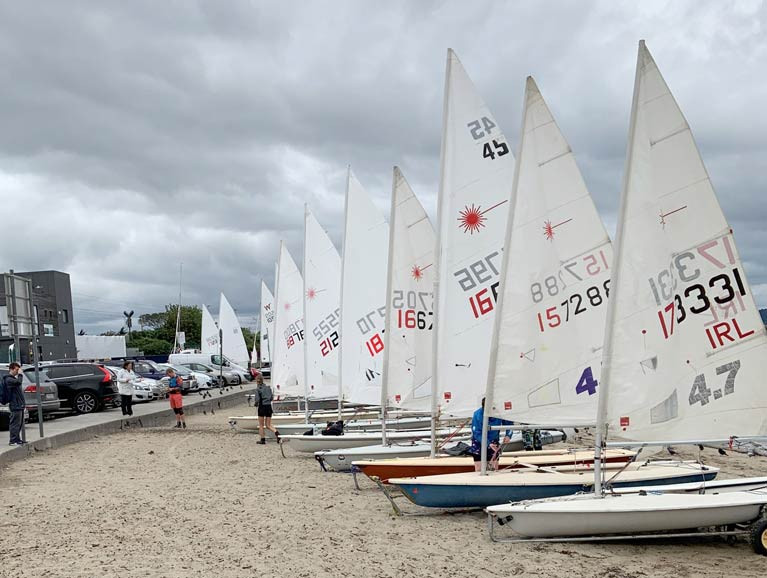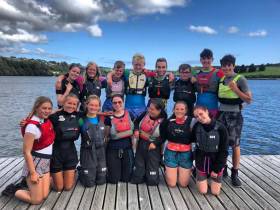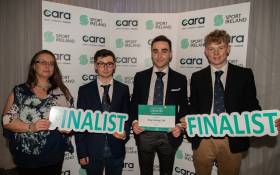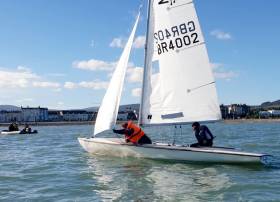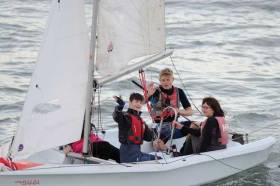Displaying items by tag: Bray Sailing Club
Bray Sailing Club and the Droleen Dinghy in Focus at Historical Society Talk by Vincent Delany
A talk on the maritime development of Bray Town in the 19th century will be held by Vincent Delany, a renowned maritime historian, at the Royal Hotel in Bray on November 16th, 2023 at 8:00 pm.
During the talk, Vincent Delany will highlight the key people who held important positions in the town in the 19th century. He will delve into the great Regattas that took place in Bray from 1862, which attracted thousands of visitors from Dublin who travelled by train to attend them.
 A recently built Droleen is ready to race
A recently built Droleen is ready to race
The Regattas contributed to the establishment of the Bray Sailing Club in 1896, whose members built a unique one-design dinghy for Bray known as the Droleen that did not survive for long.
Vincent Delany will describe the reasons behind the collapse of the class and how it was revived in the 21st century. Today, there are six known Droleens ready to race.
Bray Sailing Club’s Partnership with Lakers Continue
Last week saw Bray Sailing Club’s partnership with Lakers return for the 2023 season.
Lakers is a local sports and activities club for children and adults with intellectual disabilities.
Blue skies, sunshine, and perfect wind conditions greeted the volunteer Instructors and sailors for their first session of the 2023 season, which will see Lakers members take to the water for six sessions over the course of the next few months.
Lakers and Bray Sailing Club have had a close partnership since the summer of 2017, with close to 40 different Lakers members taking to the water. The programme has run each year since then, except for a Covid-interrupted year in 2020, and sees regular “Lakers at Sea” participants and new “Lakers Try Sailing” members enjoying the thrills and spills of sailing!
The partnership began when the BSC Instructor team invited Lakers along to a Try Sailing session and has grown from strength to strength since.
The Bray SC Senior Instructor at the time and now volunteer Inclusion Officer, Jack Hannon, explained that “we, as an Instructor team, get so much fun and enjoyment out of sailing that we want to help as many people enjoy it as possible and remove any barriers that we can”.
While the Lakers' Partnership with Bray SC may be the most obvious aspect of the club’s Inclusion in Sport programme, it is only one part of it. The Club regularly opens its doors to participants of varying ability levels as part of its Junior Training programme, which takes eleven weeks from the middle of June to the end of August. The Club also welcomes adult members of all ability levels to partake in weekly training and racing activities. Try Sailing courses in conjunction with Wicklow Sports and Recreation Partnership have also been run over the last couple of years, which have seen some participants join as club members following their course.
Bray SC has invested much time and resources into its evolving and expanding Inclusion in Sport programme over the last number of years. The Club has two volunteer Inclusion Officers in place to organise, oversee, and plan the activities for the season, and the club now owns two Hansa 303s, as well as having four members with their own personal Hansa boats. A number of these members have gone on to represent the Club at national competitions, and one has even flown the Irish flag on the international stage.
Bray SC is currently looking for a Hawk 20 keelboat to expand its inclusion fleet further.
Bray Sailing Club Keelboat Regatta Set for Next Weekend
Bray Sailing Club has announced details of its Keelboat Regatta to be held next Saturday 20 May.
Racing will be provided for cruisers, both fin- and bilge-keel boats and Flying Fifteens — and visiting competitors are also very welcome.
The Sailing Instructions and Notice of Race can be downloaded HERE.
Non-members can register by completing the online registration form HERE.
The event will be followed by prize-giving and a barbecue, the club adds.
Launch of ‘Bray Sailing Club’s Droleen Dinghy’ Book
On Friday evening, April 1, Vincent Delany launched ‘Bray Sailing Club’s Droleen Dinghy’ book at the County Wicklow club in Bray harbour.
Vincent’s Co-author Jim Horgan was at the launch. Unfortunately the third author, Michael Weed was isolated in Donegal and unable to attend.
The book describes how the Droleen is the third oldest one-design in the world after the Water Wag (1886) and the Sutton Yacht & Boat Club’s Nipper Class.
Also at the book launch was Esther De Groot whose late husband Frank De Groot was one of the driving forces behind the Bray Droleen Project.
No Droleens survive from the 19th century, but five boats have been built within the past 20 years- and in 2021 they held their first-ever Irish Droleen Championship in Dun Laoghaire. It is planned to repeat this in Bray in 2022.
Bray Sailing Club’s Droleen Dinghy is €20 and is available from [email protected] or 086 8575374.
Following the recent easing of restrictions, and having had to cancel two early season regattas, Bray Sailing Club held a “Back to Sailing” dinghy regatta on 25th July. COVID-19 restrictions meant a number of changes to normal arrangements (no race office - online registration only, no changing rooms and showers, no bar, no paper documentation, and a brief outdoor prize-giving following racing.
38 sailors in 31 boats registered for the event in a 23 boat single-handed fleet and an 8 boat double handed fleet. Race Officer Mark Henderson delivered four races before the wind collapsed and the rain took over, with a mix of two-lap windward-leeward and triangular courses. The strong tides which the north Wicklow Club’s coastline is renowned for proved challenging for some of the less experienced sailors, but some recent entrants to the club’s Laser fleet impressed their more seasoned competitors by their skills, and gave them a warning for the future.
42% of the competitors were female, continuing Bray SC’s long tradition of a strong gender balance in all the club’s fleets.
Speaking at the prize-giving, Commodore Boris Fennema said: “Following a very disappointing start to the season, it was really encouraging to see today’s turnout. One of the highlights is the number of “new” Laser sailors in the club which shows that our investment in Junior Training is really paying dividends, but it is also great to see our slightly older Laser sailors giving the new recruits something to aim for. We look forward to building further on today’s success as we plan more events this season.”
The single-handed fleet was won by David Bailey (Laser full rig), with brothers Adam and Ian Walsh (RS200) taking the honours in the double-handed fleet.
Bray Sailing Club’s Annual Table Quiz Unites Members Online
Bray Sailing Club’s annual “Brains of Bray” table quiz, which was originally scheduled to take place last weekend, faced some hasty re-engineering in the face of the COVID-19 restrictions. Organisers Jack Hannon, Mark Henderson, and Cillian Murphy decided to take the quiz online and asked participants to register in advance to be added to a dedicated WhatsApp group.
The new format meant that many more teams could be facilitated than could have fitted into Bray SC’s clubhouse, and when the quiz started at 7.30 pm an amazing 61 teams had registered, with many teams consisting of family members and friends not just in different households, but in seven different countries, and three different continents. 171 participants collaborated within their teams via a variety of tele-and video-conferencing applications, and the organisers struggled to deal with a flood of 61 emails with answers after each round.
Despite some delays in producing results due to the large volume of entries, club members and friends thoroughly enjoyed the evening which gave many families the first opportunity in some weeks to spend the whole evening in each other’s company online, while sharing a virtual drink and arguing about which colour Smartie tastes different to all the others*.
The organisers have promised to make the quiz a weekly event while restrictions continue, and have recruited additional scorers to deal with the high number of entries.
*orange
Bray Sailing Club’s “Inclusion in Sport” Programme for the 2019 Summer Season Concludes
Bray Sailing Club’s “Inclusion in Sport” programme for the 2019 summer season concluded last week with their final “Lakers at Sea” session. A large part of the club’s inclusion programme revolves around their partnership with local club Lakers (a sports club for children and adults with intellectual disabilities). This partnership, which was forged two years ago, has grown from strength to strength since formation.
After two successful seasons of growing their Inclusion programme, which saw BSC scoop awards from Irish Sailing and becoming a finalist in the Sports Club Category at the Cara National Inclusion Awards last year, the club was keen to hit the ground running this year. In preparation for the season ahead, a number of BSC’s volunteer instructor team completed pre-season training courses – these included Cara’s Autism in Sport training and also Epilepsy training. In house training courses on helping novice sailors with disabilities were also arranged for this year’s new instructors.
This summer, twelve Lakers members enjoyed regular fortnightly sailing activities as part of the “Lakers at Sea” programme. This allowed the new sailors to build on and progress their sailing skills while also trying out various types of boats as well as building their water confidence and finding their sea legs. In addition to the regular “Lakers at Sea” schedule, a “Try Sailing” course was also run, which saw six brand new Lakers members experiencing the thrill of sailing for the first time.
Ideal weather conditions with sunshine and light breezes made for ideal conditions for the final Lakers At Sea sessions. The season closed with a BBQ in the BSC clubhouse for friends and family where the Lakers members were presented with certificates to mark their progress this year.
While the Lakers Partnership with BSC may be the most obvious aspect of the club’s Inclusion in Sport programme, it is only one part of it. BSC regularly opens its doors to participants of varying ability levels as part of their Junior Training programme, which saw close to 160 juniors on the water this summer. The club also welcomes adult members with disabilities. One member, who was born without arms, recently competed in the national championships for her boat class, finishing as the second highest ranked boat in Leinster. For her efforts in challenging conditions, Mary Duffy was presented with the “Spirit of Sailability” trophy at the event.
The club-wide spirit of Inclusion in BSC was further evidenced by twenty club members volunteering their services at the Irish Sailing Watersports Inclusion Games in Kinsale at the end of August. This massive event saw over 250 people with physical, sensory, intellectual and learning disabilities taking part in a wide range of water activities, including sailing, kayaking, canoeing, paddle-boarding, rowing, surfing, water skiing, and powerboating. The volunteer team from Bray played a major part in running the sailing aspect of the games and are already looking forward to volunteering at the games next year.
BSC’s Senior Sailing Instructor, Jack Hannon, commented at the conclusion of the season, “I am extremely proud of not only the club’s volunteer instructor team, but the membership as a whole. All club members, from our youngest to the oldest, have fully embraced our inclusion programme and have helped to create the fully inclusive environment we now have in the club. With the aid of a generous grant from Wicklow Local Sports Partnership we were able to purchase a new floating platform, which has made getting our sailors on the water not only easier, but also safer. I couldn’t be prouder to be a part of this team who showcase how sailing is not only a sport for all, but also a sport for life! We look forward to further exciting plans next year to get even more new participants out on the water and enjoying sailing”.
Bray Sailing Club Finalists At Cara National Inclusion Awards
The Cara National Inclusion Awards 2018 took place in Castleknock last week and Bray Sailing Club were delighted to be one of three shortlisted finalists in the Sports Club category, along with Clontarf Rugby Club and Raheny GAA Club. The awards were presented by RTE Sports Presenter, Joanne Cantwell.
While Clontarf Rugby Club was adjudged the winners on the evening, the team from Bray SC were honoured to have been nominated as a finalist. Declan Lavelle, Commodore, commented: “It’s a great honour for Bray SC to have received a nomination for the National Inclusion Awards and it further strengthens our resolve to continue with our inclusion programme in the future. I would like to thank all of the instructors and other volunteers in the club who have put so much work into making sailing a sport for all. Our efforts in this area were greatly assisted this year by the installation of the new pontoon in Bray Harbour, which makes access to the water much easier for people with disabilities. We commend the councillors of Bray Municipal District for their foresight in supporting this investment.”
Bray Sailing Club’s inclusion programme started in 2017 when a small group of Lakers members took part in a “Try Sailing” course and has grown to such an extent that 28 Lakers members took part in sailing courses in 2018, culminating in a “Parents on the Water” evening at the end of the season. The club also caters for sailors with physical disabilities and regularly provides training for juniors with learning difficulties.
A team of sailing instructors from Bray also volunteered their services at the Irish Sailing Watersport Inclusion Games which took place in Galway at the end of August. The games were a great success, with over 200 participants taking to the water over the weekend. The Watersport Inclusion Games were awarded the winner of the “Project of the Year” award at the Cara National Inclusion Awards on Wednesday evening.
Bray Sailing Club’s Senior Instructor, Jack Hannon said after the awards ceremony “All of us at Bray SC were delighted to even be in the running for this award. We believe strongly that sailing is a sport for all and we work hard to provide equal opportunities to all in our community to enjoy the thrill of sailing. We congratulate Clontarf Rugby Club on their well-deserved award and also all the other winners and finalists on the work they are doing to promote inclusion in sport across the country.”
Bray Sailing Club are now developing their courses for next season where they plan to continue to promote and develop their “Inclusion in Sport” programme.
Bray Sailing Club Reintroduces Helmsman’s Championship
Bray Sailing Club reintroduced one of the club’s longest standing trophies this weekend as its first 'Senior Helmsman’s' Championship in fifteen years was sailed. The trophy was put on ice when dinghy sailing declined in the early 2000’s but the recent increase in adult members gave the club an opportunity to reintroduce this prestigious event.
Five invited helms from both cruiser and dinghy classes competed for the trophy. The event was sailed in Flying Fifteens (kindly lent by the owners) and the helms sailed one race in each boat, rotating after each race to remove any boat advantage. The event was umpired on the water by International Judge Gordon Davies, who is a member of the club.
After Saturday’s deluge, conditions were perfect for this white sails event with a light north-easterly breeze in bright sunshine holding steady for long enough to allow RO Mark Henderson to get all five races completed in good time, using a combination of triangle and windward-leeward courses.
The trophy (which will be formally presented at the club’s annual prize-giving in November) was won by Philip O’Reilly, with Peter Lundy in second place and Ray Comiskey in third. The best-placed boat over the event was Anorvega, crewed by Fiona Cassidy.
Speaking at the prizegiving, Commodore Declan Lavelle commented: “We are delighted to be able to reintroduce this prestigious event to our annual sailing calendar. It provides further evidence of the health of the club and the revitalising of dinghy sailing in Bray.”
The club’s Junior Helmsman’s Championship (to be sailed in Picos) was abandoned on Saturday due to lack of wind and has been rescheduled to Sunday 28th October.
Bray Sailing Club Concludes a Busy Season of Promoting Inclusion in Sailing
This week saw the conclusion of Bray Sailing Club’s 2018 “Lakers at Sea” programme which further developed the relationship between the club and Lakers members. (Lakers is a local sports and recreation club for children and adults with an intellectual disability.) This year, Bray SC hosted two “Try Sailing” courses as well as a regular sailing programme for Lakers members called “Lakers at Sea”, which saw Lakers members sailing on a fortnightly basis, instructed by a volunteer team of Bray SC Instructors.
In preparation for the season, Bray SC Instructors undertook an Inclusion Sailing Training Day with Irish Sailing’s Inclusion Officer, Ciarán Murphy back in March. This training day helped to equip BSC’s Instructor team with the skills necessary for the season that lay ahead.
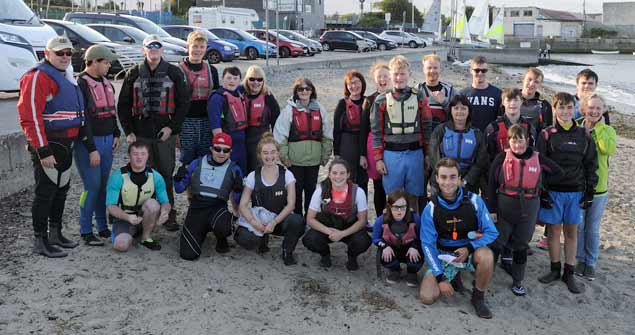 The 2018 Lakers at Bray Sailing Club
The 2018 Lakers at Bray Sailing Club
This year’s programme benefited from the summer’s great weather, with no days lost to bad weather, and this offered participants the opportunity to try a variety of boats, ranging from the club’s fleet of training dinghies to cruisers kindly provided by club members.
In all, 28 Lakers members participated during the season and the final outing of the season saw trainees being joined on the water by their parents, demonstrating that sailing really is a sport for all. The evening concluded with a BBQ and presentation of certificates in the clubhouse.
The “Lakers at Sea” programme was just one aspect of Bray SC’s efforts to expand inclusion in training – other initiatives included designing a personalised training programme for a novice sailor who was born without arms but has acquired a specially adapted Hansa Liberty with customised foot controls; and the involvement of the Club’s entire instructor team in the Watersport Inclusion Games at the end of August.
Commenting on the year’s activities, Declan Lavelle, Commodore of Bray SC said: “We in Bray are very proud indeed of our team of young instructors. The enormous voluntary commitment which they have put in this year has set a great example to the membership as a whole and showed how we can really welcome all newcomers to the sport we love.”
Jack Hannon, the Club’s Senior Instructor, said: “The whole instructor team at BSC deserves great praise for all of the hard work they have put into developing our inclusion programme this summer. After a long day’s work on our Junior Training programme to come down and give their time freely in the evenings with such enthusiasm and professionalism is something to be credited. I speak on behalf of the whole team when I say that we loved every minute of our sessions with our new trainees and our time spent working at the Watersport Inclusion Games in Galway. Sailing really is a sport for all and a sport for life, and we demonstrated this by having the parents of Lakers members on the water sailing with their sons and daughters for the final evening. While it may be the end of this particular season, I am sure this is only the start of things to come as we aim to further promote inclusion in sport in Bray SC and beyond!”


























